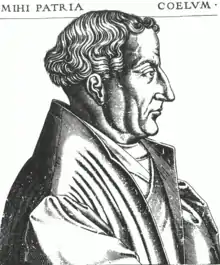Heidelberg Disputation
| Part of a series on |
| Lutheranism |
|---|
 |
The Heidelberg Disputation was held at the lecture hall of the Augustinian order on April 26, 1518.[1] It was here that Martin Luther, as a delegate for his order, began to have occasion to articulate his views. In the defense of his theses, which culminated in a contrast between divine love and human love,[2] Luther defended the doctrine of human depravity and the bondage of the will. Martin Bucer, the reformer of Strasbourg, heard Luther here and became an avid follower.[3] This disputation also led to Johann Eck's challenging Martin Luther to the Leipzig Debate.[4]
28 theses
The Heidelberg 28 theses based the disputation, and represented a significant evolution from the 95 theses of the previous year from a simple dispute about the theology behind the indulgences to a fuller, Augustinian, theology of sovereign grace.[5]
Observers
 Martin Bucer
Martin Bucer.jpg.webp) Erhard Schnepf
Erhard Schnepf Johannes Brenz
Johannes Brenz
See also
References
- Kittelson 1986, p. 111.
- Totten 2003, p. 446.
- Kittelson 1986, p. 112: "Martin Bucer, who later took up what he understood to be Luther's cause, observed in a letter to his friends, 'Luther responds with magnificent grace and listens with insurmountable patience. He presents an argument with the insight of the apostle Paul.'"
- Kolb 2009, p. 24.
- Luther 2008.
Resources
- Kittelson, James (1986), Luther the Reformer, Minneapolis: Augsburg Publishing House, ISBN 978-0-80662240-8, retrieved 2012-11-18.
- Kolb, Robert (2009), Martin Luther, New York: Oxford University Press, ISBN 978-0-19920894-4, retrieved 2012-11-18.
- Luther, Martin (Sep 2008) [26 Apr 1518], "The Heidelberg Disputation", The book of concord, retrieved 24 Sep 2017.
- Totten, Mark (2003), "Luther on unio cum Christo: Toward a Model for Integrating Faith and Ethics", The Journal of Religious Ethics, Wiley-Blackwell, 31 (3): 443–62, doi:10.1111/1467-9795.00147, ISSN 0384-9694, JSTOR 40008337.
External links
- Luther, Martin (Nov 2020) [26 Apr 1518], "The Heidelberg Disputation", The Book of Concord, retrieved 10 Nov 2020.